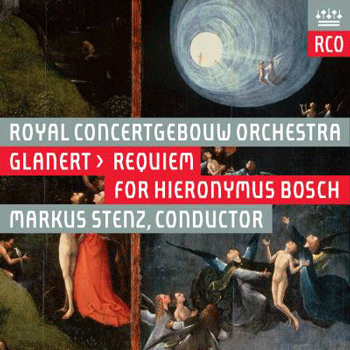It helps that the paintings are so much part of popular culture that
everyone recognizes his images of extreme excess. Bosch’s people wear
medieval dress, but their actions depict the subconscious, the ‘Id’
and existential guilt in operation, centuries before the concepts of psychology
found expression in formal language.
Like Carnina Burana,
Glanert’s Requiem is highly dramatic music theatre,
adapting the cataclysmic dreamscapes of Bosch’s paintings into music of
extremes as lurid as Bosch’s images.
Glanert’s Requiem unfolds in 18 episodes, rather like
panels in a medieval triptych. This gives the piece structure, making it easy
to follow. The teeming, sprawling panoramas Bosch depicts could plausibly be
depicted in sound, but that would probably be asking too much of most
audiences. Like Bosch, though, Glanert’s piece replicates extremes.
Literally heaven and hell, for the premise is the judgement Bosch faces after
death. Thus the standard elements of a Requiem Mass are interleaved with the
Seven Deadly Sins, the acrid flames of hellfire whipping against the smoke of
incense.
A harsh Voice (David Wilson-Johnson, narrating) calls from above
“Hieronymus Bosch!” Immediately we spring to attention. Bells
ring,. Throbbing, rushing figures in the choral line, suggesting the doomed
hordes we see in Bosch’s paintings. The orchestral lines veer wildly, lit
by screaming brass, the chorus screaming to crescendo. Suddenly the forces
fragment and, from the silence, a slow, low penitential intonation. An abstract
‘Requiem Aeternam’, the choral line flowing ambiguously, in almost
microtonal haze. like smoke. In ‘Gluttony’ the bass (the aptly
named Christof Fischesser) sings of food, his lines circular and rotund. The
text may be in Latin, but the meaning is clear. The choir responds with the
long, thin lines of an ‘Absolve Domine’, reinforced by
‘Wrath’ with tenor (Gerhard Siegel) and a ‘Dies Irae’
which ends with a vivid orchestral flourish. Another demon, ‘Envy’,
fights back. Soprano Aga Mikolaj’s fluid, curving lines mimic the lines
in the “heavenly” chorus— imitation is a sign of envy!
But the serene ‘Juste judex’ prevails. But where are we? The
organ solo (Leo van Doeselaar) lets rip with a frenzy that suggests a cathedral
organ hijacked by ‘Satan’. Despite the extremes of volume and
tempi, the lines between heaven and hell are, tellingly, blurred. In
‘Sloth’, the soprano sings langorously, joined in sensuous duet by
the mezzo (Ursula Hesse von den Steinen). ‘Pride’,
‘Lust’ and ‘Avarice’ appear, but the balance shifts
towards the big guns : Full choir, offstage choir, and orchestra in
increasingly full throttle : listen for the jazzy culmination of the
‘Domine Jesu Christe’. and the funky trumpet that heralds the
‘Agnus Dei’.
With the ‘Libera Me’ and ‘Peccatum’, we are in
Carmina Burana territory, bursting forth in a blaze, the earthly
chorus in raucuous flow, augmented by brass and percussion and the offstage
chorus singing of ‘lux perpetua’. Big forces. But is might right?
Glanert’s Requiem ends ‘In Paradisium’, here the
‘Voice from Above’ recites lines from the Book of
Revelation. Apocalyptic visions, marking the end of the world and of time.
Now, when the Voice screams “Hieronymus!”, he doesn’t add a
demonic epithet. With an unearthly low hum, the choir sings of the chorus
angelorum that brings eternal rest.
Glanert’s Requiem for Hieronymus Bosch was
commissioned to celebrate Bosch’s 500th anniversary, and premiered in
Sint Janskathedraal, ‘s-Hertogenbosch, in April 2016. So it’s a
public piece rather than a work of inward inspiration. It must be great fun to
perform, without being particularly demanding, technically or interpretively.
It could, in theory, be performed elsewhere, much as Carmina
Burana is, these days. It is admirably performed on this world
premiere recording made in November 2016 with the top-notch Royal Concertgebouw
Orchestra Amsterdam, conducted by Markus Stenz.
Glanert was one of Hans Werner Henze’s few disciples. Henze’s
political beliefs influenced his music, though he never sacrificed high
artistic and intellectual standards. Glanert is a man of the theatre, too, with
a more earthy sense of humour than Henze had, though that quirkiness
isn’t too obvious. When the ENO did Glanert’s
opera Caligula, London audiences just couldn’t get it.
(Please read HERE what
I wrote about Caligula, which I first heard in Frankfurt). In
this Bosch Requiem, Glanert again mixes grotesque with irony.
Just as the vastness of Carmina Burana appealed to Nazi
taste, the vastness of this Requiem veers on parody. Will it
be loved for its vulgarity or its irony? Just as the paintings of Hieronymus
Bosch reveal the viewer, Glanert’s Requiem reveals the
listener.
Anne Ozorio
